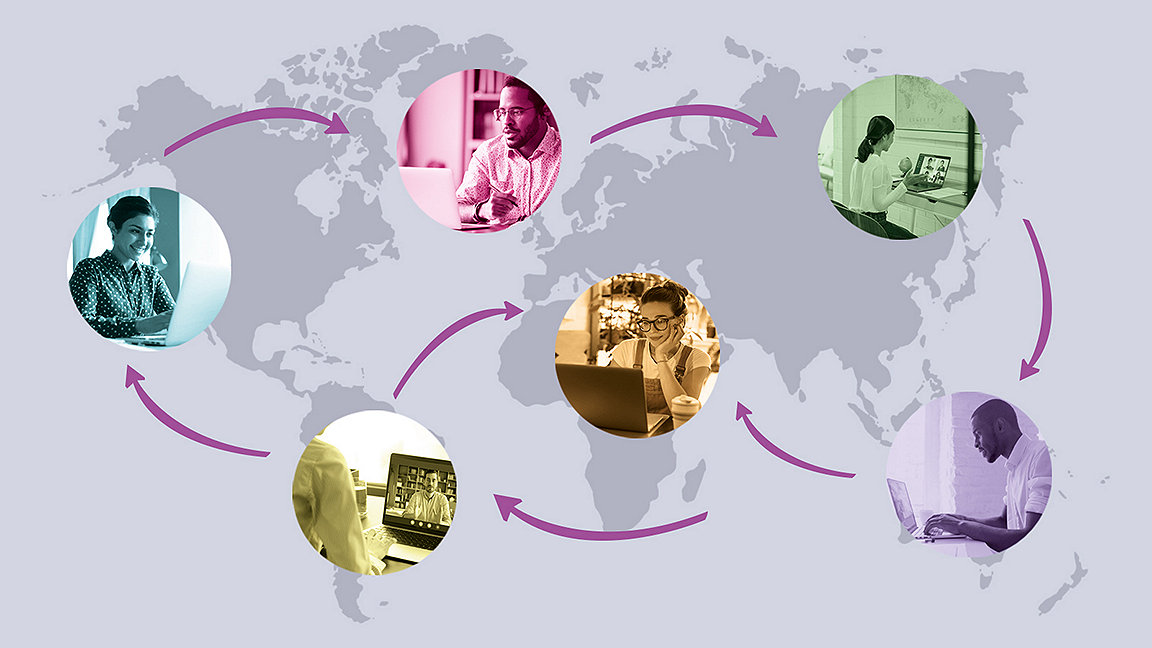
Since March 2020, most office workers in the world’s major cities have been based at home – a blessing for some, a nuisance for others. At least established workers have experience of their jobs, their workplace culture and a good knowledge of who does what within their company on which to fall back. For new recruits and, in particular, for graduate trainees, limiting all their interactions to online meetings has made learning on the job and bonding with the rest of their team much more of a challenge.
“For younger staff, now we’re not in the office, learning by osmosis, being in proximity to people who are more senior and doing work, isn’t available to them,” says Gordon Reynolds MRICS, international partner in Cushman & Wakefield’s logistics & industrial team. “You can try and replicate that on Teams, but it’s no substitute for the benefits that come from proximity.”
By harnessing tech power, three companies from three continents reveal the ways they have found of showing new colleagues what office life was like pre-COVID-19.
Savills, UK
Every week, the London-based firm has new recruits playing Coffee Roulette: two names are pulled out of a hat, allowing strangers on-screen, one-to-one time with colleagues.
“Instead of it being dozens of dozens of faces on Zoom, graduates end up talking to people who they wouldn’t have normally,” says Noel McGonigle, HR director, UK, Europe & Middle East.
Through the company’s “Instagrad Challenge”, graduates have been asked to capture a snapshot of their first month, while being set a challenge to come up with an innovative way to share their experiences. Split into teams, they were mixed by location and division and asked to work together to creatively capture this snapshot via social media.
The winning entry saw five graduates from around the UK take the reusable branded coffee cup from their welcome pack on a Savills journey across five different departments and four different offices: it travelled virtually from Perth in Scotland to London.
More traditional methods of internet bonding are also employed. Training programmes have been maintained but adapted to being virtual. “This ensures we have networking opportunities and interactive activities such as virtual city tours,” says McGonigle.
Regardless of lockdown, McGonigle says: “The same guidelines on what you put out there in terms of representing the organisation continue to apply in maintaining our corporate image. That level of professionalism, both internally and externally, is still important.”
Surbana Jurong, Singapore
The global urban-infrastructure, and managed-services consulting firm was quick to implement digital and tech solutions across its 120 offices to enable staff to continue working remotely.
It established the Surbana Jurong Business Continuity Planning taskforce, which led the company past the challenges of the pandemic. “Navigating through COVID-19 has heightened the importance of bridging connections across geographies and cultures,” says company CEO Wong Heang Fine.
From virtual yoga and music jamming sessions to online cooking get-togethers and Friday drink sessions, Fine says employees found ways to stay positive and connected from the safety of their homes.
“We also organised staff ‘townhall’ sessions that were mostly livestreamed to a global audience, allowing colleagues to be updated on group-wide activities and happenings.”
Fine says a long-lasting effect of the pandemic on employees means there will be a greater appreciation in a hybrid model of working. He says it will be one which “values in-office meetings for idea-sharing, project kick-offs and close collaboration, and remote working for flexibility and individual focus.
“In our new SJ global headquarter campus, we are envisioning workspaces that will enhance the level of collaboration amongst employees to help them innovate, create and solve problems better.”

From virtual yoga and music jamming sessions to online cooking get-togethers and Friday drink sessions, employees found ways to stay connected from their homes.
Cushman & Wakefield, US
Through the company’s Future Leaders, an employee resource group, there has been “a lot of pulling everyone together, and hearing from leadership of ‘How do we handle this?’ ‘What should we be focusing on?’ and ‘How do we redirect our focus?’” says Christina Urwand, talent acquisitions programme manager in New York. “So they have done a great job of leading the charge for our young people.”
As part of its rotational programme – in which graduates get experience in all major service lines, the US arm of the international firm, made sure new hires didn’t miss out on group meals together, for example, by organising internet dining.
And as a result of the pandemic, the Virtual Exposure Programme was developed, “as a band-aid if we had to cancel our internships,” says Urwand. This allowed interns who are able to earn money elsewhere or have other commitments they need to fulfil during the summer break – when many unpaid internships take place - to do the two-to-four hour a week Virtual Programme.
“Everything is recorded so if they miss a session, they can go back and take it whenever they want. It’s all about educating at this entry level and being flexible for them,” she says. “We did everything from Build Leadership Speaker Series, talking about each service line, while Future Leaders provided mentorship programmes.”
Mental health was also high on the virtual agenda. Wellness Wednesdays are webinars that include practices such as yoga, meditation, time management, “because everything is office time if you let it be, or it can be couch time,” says Urwand.
Ultimately, says Urwand: “It’s about keeping in touch, so [the graduates] know who we are, how to contact us, what we do in the organisation as recruiters and what jobs are available, and what they should look out for.”

